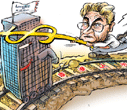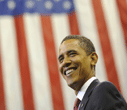Domestic
China Southern to ride out of turbulence
By Wang Ying (China Daily)
Updated: 2009-06-03 10:30
|
 China Southern Airlines logo at the Beijing Captial International Airport.[Bloomberg News] |
China Southern Airlines looks set to be the first mainland carrier to fly out of the financial turbulence after getting a capital injection of 3 billion yuan from the government.
A company official told China Daily that the money would be used to help reduce outstanding debt, which is weighing down not just China Southern but also the other major carriers like China Eastern and Air China, which had borrowed heavily in the past to finance their expansion spree.
More importantly, the Guangzhou-based airline has largely avoided the fuel hedging losses that have sapped the financial strength of the other two carriers.
Indeed, the performance of China Southern's management was so highly regarded that its former president Liu Shaoyong was installed at the helm of ailing China Eastern, which has a debt exceeding the value of its total assets.
Yao Jun, analyst, China Merchants Securities, expects the ailing aviation industry to get a boost in the coming peak season.
"We should not underplay the potential demand from the domestic market and the resilience of national carriers. With the backing of the central government, the carriers will change the bleak picture during its traditional peak season, or the second and third quarter of the year," said Yao.
With a healthier performance record and strong financial structure, China Southern is widely seen to be in a better position than its rivals in taking advantage of an upsurge in traffic demand.
"We can expect a two-digit growth in May and June," Yao said.
Shenzhen-listed China Southern said on Monday in a statement that the China Securities Regulatory Commission (CSRC) had cleared its plan to issue 721.1 million A shares at 3.15 yuan each and the same amount of H shares at 1 yuan each to its State-owned parent company China Southern Air Holding Co.
China Southern had started to prepare for the new share issue as early as the end of 2008 itself. It is not clear why the plan was not approved till now.
Hit by declining passenger traffic, China's three major carriers reported an aggregated loss of 27.9 billion yuan in 2008. China Southern booked a loss of 4.829 billion yuan in 2008.
To bail out the national carriers, the central government agreed to inject 3 billion yuan to China Southern's parent company last November.
China Southern shares were unchanged at 5.25 yuan yesterday in Shanghai, while its H shares declined by 7.083 percent to close at HK$ 2.23.
"The market has already digested the brunt of the additional issuance in the previous months, and the new announcement is in line with market expectations," said Li Lei, industry analyst, CITIC China Securities.
An insider from China Southern, who asked not to be named, said the funds raised would be used cautiously and wisely, and there won't be any big purchases.
"With the new money, China Southern's debt-to-equity ratio will be diluted by 3.55 percent from 88.39 percent in the first quarter," said the source.
During the first quarter of 2009, China Southern reported a net profit of 222 million yuan, a drop of 71.32 percent from the same period in 2008.
According to Yao, the aviation sector has received special "treatment" from the central government.
"Since June, prices of petrol and diesel have been hiked by 400 yuan per metric ton, the second price rise after the Chinese New Year. But the price of jet fuel stayed at the same level as April, much lower than the same period last year, which provides carriers a substantial profit at the critical moment," said the analyst.
Li said it is important for the carriers to keep the debt-to-equity ratio at a low level.
"Chinese carriers are now poised for fast growth, and they should keep tabs on the rising debt. In foreign countries, carriers usually maintain their debt-to-equity ratio at 60 percent," Li said.
Si Xianmin, chairman, China Southern, said there still remains a lot of uncertainty for 2009, and it is hard to predict whether they would make a profit or not.
"Our basic judgment is that the domestic aviation market will outperform the overseas market, and the second half of this year would exceed the first half," Si was quoted as saying by the Securities Daily on Monday.













